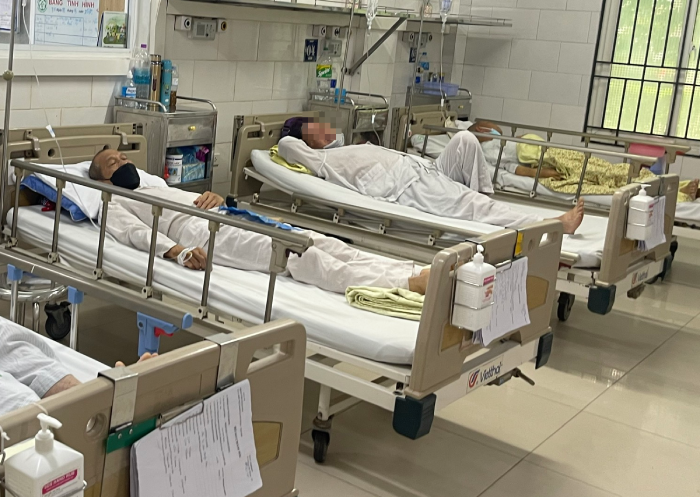
A lung cancer patient, who visited E Hospital for examination and treatment, revealed that she has returned from Singapore where she received treatment at a high cost, about several billion dong. The doctors in Singapore prescribed a targeted therapy of take 30 tablets a month, which cost $7,200 (VND183 million).
She was surprised when hearing that the same medicine is available in Vietnam priced at VND42 million. The medicine in both Singapore and Vietnam are products manufactured by a pharmacy firm in Sweden.
In Singapore, besides the medicine, she also had to pay for many kinds of services, such as MRI scan with contrast, which costs $1,340 (VND34 million), while the equivalent service in Vietnam costs only VND2.2-2.5 million. Similar cost differences are noted with PET/CT scans, where the price in Singapore was VND52 million compared to VND20-25 million in Vietnam. Meanwhile, the patients with health insurance just have to pay VND3-4 million.
According to the patient, when doctors told her that she contracted lung cancer, she was very anxious and immediately thought of seeking treatment abroad to access the best medications.
However, after consultations with doctors, she felt secure about continuing to receive treatment in Vietnam.
M.T.D, 70, from Hai Phong, who is being treated at the Nuclear Medicine and Oncology Center, belonging to Bach Mai Hospital in Hanoi), is a similar case.
D, who has lung cancer, underwent surgery in Singapore and was prescribed immunotherapy. After some time enduring high treatment costs and inconvenience, she returned to Vietnam to seek further advice at Bach Mai Hospital.
D was surprised when hearing that the medicine prescribed to her in Singapore is common in Vietnam. Under a support program run by the manufacturer and supplier, the price of the medicine is just one-tenth of that in Singapore.
D, who has been treated for two years, said her condition is stable and the costs remain manageable.
N.T.C, 56, of Hanoi, who has stomach cancer, underwent a gastrectomy and lymph node removal at Bach Mai Hospital. After the surgery, C wanted to go to Singapore for further treatment but after a period, he returned to Vietnam.
"It turned out that the treatment plan prescribed by the doctors in Singapore was exactly the same as what doctors in Vietnam had prescribed for me. Had we known this, we wouldn't have gone abroad, which was not only costly but also time-consuming and delayed my treatment process," C. said.
Why are medicines in Vietnam cheaper?
According to Associate Professor Pham Cam Phuong, Director of the Nuclear Medicine and Oncology Center at Bach Mai Hospital, many cancer patients who had initially received treatment in Japan and Singapore decided to return to Vietnam for treatment at the center.
Initially, upon being diagnosed with cancer, patients often experience anxiety and believe that advanced treatments such as targeted therapies and immunotherapies might not be available in Vietnam, prompting them to seek treatment abroad.
Many patients only returned to Vietnam after they became financially exhausted in foreign countries, and they regretted going abroad and realized that the medicines are available in Vietnam. Meanwhile, patients can also get discounts thanks to special programs run by the Ministry of Health and pharmacy firms.
Phuong said that patients in Vietnam can now receive treatment therapies that are nearly the same as ones in developed countries, from surgery and chemotherapy to radiation, as well as targeted and immunotherapy treatments.
Medical professionals in Vietnam now have access to treatment options that are on par with those available in Japan or Singapore. Hence, patients can be reassured of receiving high-quality care domestically, rather than going abroad and having to pay high costs and face difficulties because of as language barriers and dietary differences.
From January 2019 to 2023, the Ministry of Health (MOH) approved 18 drug support programs, under which over 6,000 patients suffering from severe disease received a total of VND1.6 trillion in assistance.
Patients gained access to necessary treatments, especially expensive patented medicines and biologics not covered by the national health insurance fund. On average, each patient received financial support of VND264 million.
Vo Thu